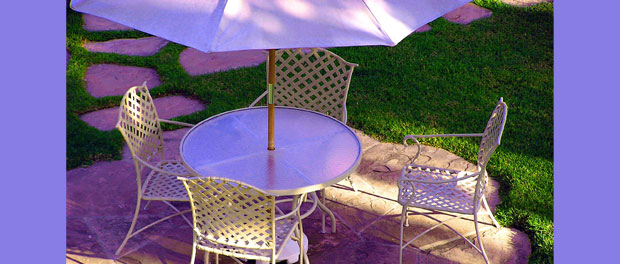 As the weather improves and we bid farewell to what always feels like a long, cold winter, the backyard patio quickly becomes the most important “room” in our house. We all find ourselves drawn outside to read, share a cool beverage, have a nice chat, or just soak in some sun. We spend a lot of time on the patio, and many great family memories are created right here in our backyard.
As the weather improves and we bid farewell to what always feels like a long, cold winter, the backyard patio quickly becomes the most important “room” in our house. We all find ourselves drawn outside to read, share a cool beverage, have a nice chat, or just soak in some sun. We spend a lot of time on the patio, and many great family memories are created right here in our backyard.
As I sat on the patio the other night, I slowed down a little to consider why I love it out there so much. I often notice the changing colors of the blooming flowers, the lush green of the grass, and the beautiful blue sky with birds and clouds that work collaboratively to offer their admirers an ever-changing canvas. To a lesser extent, I also notice the sounds on the patio: the birds’ changing melodies, neighbourhood children playing exuberantly, lawn mowers hard at work. I admit, however, that I usually stop short of appreciating the scene beyond those two aspects. How often do I venture off the patio to feel the grass through my fingers and toes? How often do I close my eyes and inhale deeply the smells of this little retreat of mine? Have I ever tasted the fresh spring air?
Composition of place, St. Ignatius instructs, involves using all of our senses to come into the scene in a contemplation. Contemplation has never come very easily to me, and in that moment on the patio, realizing that I seldom use all my senses to appreciate this beautiful world God created, it struck me that the same challenge is present for me in composition of place. Just as in my day-to-day life, I tend to limit my composition of place to the more ready senses of sight and sound. I forget to slow down and engage all of my senses in the scene.
I don’t know if Ignatius had a parallel saying to “practice makes perfect,” but I think he would agree that by slowing down each day to observe the world using all of our senses, we might better incorporate them in our composition of place. This might then lend to an even more profound prayer experience.
Slow down. Feel the world around you. Taste it. Smell it. There is grace to be found in all of it.

Allow me to add my thanks to you for reminding all of us of perhaps the most obvious place where the central Ignatian tenet that “God can be found in all things ” exists in the beauty and silence of nature.
Thank you for that important reminder. We often live so close to our lives that we often lose sight of Gods hand in it all.